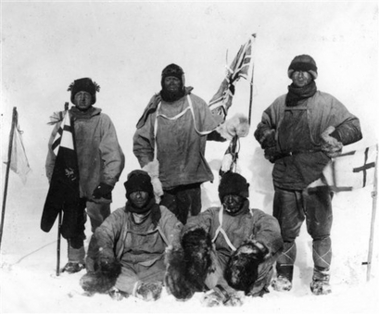Antarctic explorer's letters made public
(AP)Updated: 2007-01-11 10:01
LONDON - Knowing he was days from death on a tragic trek back from the South Pole in 1912, Capt. Robert Falcon Scott wrote to his wife that "we are in a very tight corner and I have doubts of pulling through."
 This is a handout image released by Cambridge University on Wednesday Jan. 10, 2007 of the members of Capt Scott's ill fated South Pole expedition pose at the pole in January 1912. The team are standing, left to right - Lt. Henry (Birdie) Bowers, Capt Robert Falcon Scott, Dr Edward Adrian Wilson. Seated, left to right - Petty Officer (PO) Edgar Evans, Capt Lawrence (Titus) Oates. Cambridge University are to put on display a number of letters of Capt Scott from January 17, 2007 to mark the 95th anniversary of Scott's arrival at the South Pole. [AP] |
However, he assured Kathleen Scott, he faced his end without regret. "How much better it has been than lounging in comfort at home," Scott wrote in the letter, recovered the year after he and his companions died of cold and starvation.
Scott's courage in facing his doom - following the bitter disappointment of losing the race to the South Pole - burnished his stature as a national hero, and was an inspiration to generations of British youth.
Now the British explorer's last letter to his wife, previously published only in part, will be among those displayed to the public in his own sprawling handwriting for the first time beginning Jan. 17 at the Scott Polar Research Institute at Cambridge University.
"As one who works as a scientist in the polar regions, particularly the last letter conveys the tremendous sense of isolation," said Professor Julian Dowdeswell, director of the institute founded in 1920 as a memorial to Scott.
"When you are working on large ice caps ... you do feel an awfully long way from home, and that's with modern communications," said Dowdeswell, speaking by telephone Wednesday from Uruguay, where he was waiting to depart for the Antarctic.
Scott's private correspondence was recently donated to the institute by Philippa Scott, widow of the explorer's only child, Sir Peter Scott, who died in 1989.
"Make the boy interested in natural history if you can,
it is better than games," Robert Scott wrote from Antarctica. His son, then 3,
went on to graduate from Trinity College, Cambridge and have a distinguished
career in ornithology.
| 1 | 2 |  |
|
||
|
||
|
|